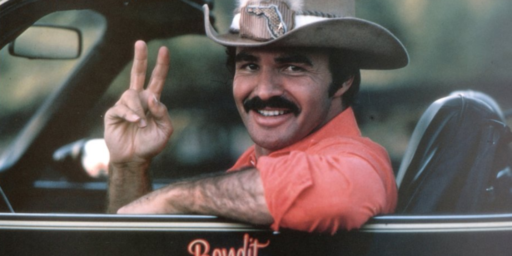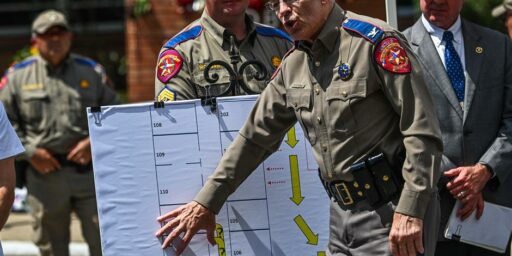Danger of a Paramilitary Police Force
Glenn Reynolds has an interesting essay in Popular Mechanics about the proliferation of SWAT teams and the transformation of police forces into paramilitaries.
The trend toward militarizing police began in the ’60s and ’70s when standoffs with the Black Panthers, the Symbionese Liberation Army, and the University of Texas bell tower gunman Charles Whitman convinced many police departments that they needed more than .38 specials to deal with unusual, high-intensity threats. In 1965 Los Angeles inspector Daryl Gates, who later became police chief, signed off on the formation of a specially trained and equipped unit that he wanted to call the Special Weapons Attack Team. (The name was changed to the more palatable Special Weapons and Tactics). SWAT programs soon expanded beyond big cities with gang problems.
[…]
This approach, though, has led to problems both obvious and subtle. The obvious problem should be especially apparent to readers of this magazine: Once you’ve got a cool tool, you kind of want to use it. That’s true whether it’s a pneumatic drill, a laser level or an armored fighting vehicle. SWAT teams, designed to deal with rare events, wound up doing routine police work, like serving drug warrants.
The subtle effect is also real: Dress like a soldier and you think you’re at war. And, in wartime, civil liberties—or possible innocence—of the people on “the other side” don’t come up much. But the police aren’t at war with the citizens they serve, or at least they’re not supposed to be.
Indeed.
Reynolds observes that the difference between soldiers and policemen is “the difference between Audie Murphy and Andy Griffith.” Interestingly, even cops on television have changed over the last twenty yers or so. We’ve gone from the calm professionalism of Joe Friday (“Dragnet”) and Pete Malloy (“Adam-12”) to the thuggish behavior of Mick Belker (“Hill Street Blues”) and Vic Mackey (“The Shield”). Even the real-life officers on shows like “Cops” are often distinguishable from the criminals they arrest only by their uniforms.
It’s true that Andy Taylor and Joe Friday never faced street gangs armed with Uzis. Then again, neither do 99% of today’s police officers. But by adopting the attitude and accouterments of an occupying military, they have lost far more in community goodwill than they have gained in effectiveness. Many if not most law abiding citizens are wary of cops, nowadays, viewing them as a necessary evil rather than heroic public servants. That’s truly a shame.






James, I’m glad you posted this. The militarization of policemen is a phenomenom that has increasingly concerned me. I’ve said before some of this may be due to the Hollywood portrayal of policemen in action films, and that some real cops actually believe the stuff they see in the movies and on TV. I long for the days of the friendly neighborhood beat cop that everyone knows. Nowadays, it seems some police naturally assume anyone they come across in the line of duty is guilty until proven innocent and most grovel and behave in a subservient manner before the public servant (policeman) when questioned. How do we correct this? I’m all for civilian oversight of the police to correct this behavior, and punish those that get out of line. After all, they work for us.
I respectfully dissent in part. It wasn’t that 99% of the Andy Griffins and Joe Fridays didn’t face gangs with Uzis and body armor. It’s that 100% of the Andy Griffins and Joe Fridays didn’t face gangs with Uzis and body armor.
If you’re today’s cop, and you are the one guy on the force on the one day of the year in which you do face a gang with Uzis and body armor, you are probably a dead cop unless you have equipment, tactics, and willingness that can compete. And you simply don’t know from day to day whether you are going to be in that 1% on that particular day. So you either have to be ready for it every day, alert for the prospect, and on guard — meaning not Andy-Griffin-like, and definitely not Don-Knotts-like, but ready-to-be Clint Eastwood-like — or you multiply many-fold the possibility that you’re the subject of the bagpipes and dress uniform column three days later.
It may be that police attitudes have changed, but they haven’t changed in a vacuum or without stimulus. It’s simply a much harder and vastly more dangerous job now than “your father’s policeman” faced.
Beldar,
Indeed, my father was a policeman–both an MP and a CID agent, including a stint as an undercover narcotics agent, in the 1970s and 1980s. I don’t doubt that the climate has changed somewhat since then, although the incidents of police shootouts with gangs with automatic weapons and body armor can probably be counted on one’s fingers.
The bottom line is that cops, like soldiers, willingly assume risks. Both must do their job within rules of engagement. Treating all civilians as if they are potential criminals out to kill them might save a couple cops’ lives (although that’s not a slam-dunk; cops with attitudes often back people into corners and incite reflexive retaliation to maintain dignity) but they cost far more in damage to police-community relations. As in counterinsurgency, police need to have the “hearts and minds” of the community to be effective.
Beldar,
Let me turn it around on you a little. The same argument can be applied to soldiers, but we tell them unsympathetically that their lives are expendable for the “greater good.” Every serviceman knows that he may be expected to give his life in service of his country and sorry, you don’t deserve either a military or police uniform and weapon if you cannot accept that. With the ability to execute the state’s awesome privileges on the use of forces comes the knowledge that unlike a normal civilian, you may be required as part of your professional duties to risk your life to not make mistakes that could hurt a private citizen.
What really doubly hurts the public is the double standard that law enforcement enjoys. As I have said, the police rarely enjoy a rational right to claim “fog of war” on their end because it is their duty to corroborate informants’ information, conduct surveillance and use force like a civilized human being. Yet the law enforcement process as a whole (including prosecutors) protects its own when it makes mistakes, but when a private citizen mistakingly shoots a cop, they are charged to the nth degree. I think you ought to be very afraid of the moral health of anyone who conducts a midnight no knock raid on an innocent person, then holds them accountable when they wake up in a confused state and shoot a cop enforcing a warrant thinking he or she is a crook. The very purpose of the raid is to catch them dazed and confused, but somehow they are supposed to know better.
All of this is really a problem because the police do not regard the use of force the way the military does. The only thing that has been militarized is the capacity to use force, not an understanding of the ramifications of using it. I think you would be hard-pressed to find a military commander who would do anything other than question your sanity for suggesting that a full on militarize assault for a few joints of a pot or a few lines of cocaine is justified. I would imagine that would be especially true now of the people returning from Iraq who have seen up close how ugly urban warfare is, and know that there is precious little difference between the 4th ID raiding a home and a SWAT unit raiding a house.
James,
Although I usually find Reynolds’ intellectual bar-hopping annoying, I am in complete agreement here. I am especially struck by your comment,
The importance of that cannot be overstated. Being a cop, just like firefighters or the military, implies a certain risk to life and limb. We should, of course, try to minimize that risk, but it can never be eliminated.
Also,institutionalizing an ‘us-vs-them’ mentality destroys the respect ordinary citizens ought to have for the police. It shifts their own loyalty more to their fellow officers rather than to the society they protect, and as your colleague Steve Verdon might agree, that makes it much harder to root out the bad cops…
Witness policemen using tasers to compel behavior. Stand up! Zap. Stand up! Zap. Stand Up! Zap Stand Up! Zap.
Tasers like guns should be used only in defensive situations, if at all.
Over 140 suspects have died in taser-related incidents, some of whom were being charged with no more than tresspassing.
Witness the ATF raids.
Witness erroneos home invasions by police in the war on drugs.
The police are not he problem. The criminal is the problem. Hoever, police policy and tactics, whichh are determined by police chiefs and elected civilian leadership are the cuase of the violation of rights of innocent and guilty suspects alike.
You know, before Uzis, there were the Thompson submachineguns and Browning Automatic Rifles of Bonnie and Clyde infamy (if I recall correctly, the Thompsons cut them down in an ambush after they cut lots of other people down with BARs and pistols), along with that deadly short-range standby, the shotgun. The days of the friendly neighborhood beat cop were also the days of the “third degree” and rubber hoses. I have more confidence in today’s police than I do in the storied days of yesteryear, as apparently does Scott Gosnell, another of our bloggers at Pros and Cons (BTW, please help me convince him not to quit blogging), although for different reasons.
Professional, college educated police (in Scott’s case, moonlighting in the police reserves when he isn’t lawyering away in intellectual property cases) are generally a better bet than sheriffs from the old dry counties picking sides between the Klan and the Knights of Columbus, or New York City’s pre-Serpico force.
it used to be “to serve and protect” it used to be “police protection” now it is “compliance” and “law enforcement” . not so subtle differences. this article NEEDED to be said thanks James. thanks also to Beldar, whose contribution proved the point.
You know, Colors was a movie and as such should not be the basis for an argument. Further you have totally distorted James’ position. James’ actual position is as follows,
In other words the Andy Griffins and Joe Fridays, 100% of them, never encounterd uzi toting thugs. And only about 1% of todays police do. You have clearly changed James’ argument into something you could more easily defeat.
And that cop was most likely a fool. If he doesn’t have the equipment and training he should call in SWAT. Nobody is calling for a complete disbandment of SWAT units. At least nobody that is being serious about this issue. What people like Reynolds, myself, James and Radley Balko and others object to is using these paramilitary commando police units agains non-violent offenders. When you do this it seesm inevitable that eventually you end up with a Sal Culosi situation. So please, deal with the actual argument and not some made up fantasy of your own.
Further, being a police officer is about dealing with the criminal element of society. As such it carries with it risks. But that is part of their job and partly what they are paid to do.
I think this is highly misleading. The kinds of events you are talking about are rare. If 1% of police officers encounter these situations, then they are rare. Further, this is the reason why a SWAT team should be around, but not out busting the guy who grows a couple of pot plants in his backyard, killing his dogs, terrorizing his family, and needlessly damaging his property, and possibly killing one or more innocents in the process.
This also brings up another side issue, the militarization of Mayberry. How come so many tiny little towns with zero or 1 or 2 murders over several years have SWAT teams? Granted, I suppose it is possible that a gang of uzi toting, body armor wearing thugs might invade, but that sounds wildly implausible to me. If you are this risk averse it makes me wonder how the heck you manage to get out of bed in the morning. After all, you could slip and break your neck.
As a side note, you seem quite willing to trade off innocent civilian lives for police officer lives. This seems repugnant to me considering that the former did not have any choice in assuming risk (recall these are innocent civilians as it appears in the Kathryn Johnston case) and the latter did understand the risks when agreeing to take a paycheck and put on the uniform.
All in all here you seem to have virtually no argument besides distorting James’ initial position.